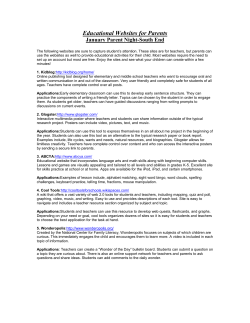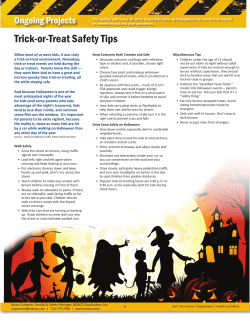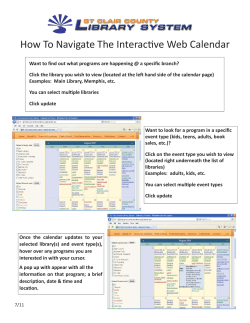
make the difference! Experts share ways to reduce screen time
November 2014 Vol. 26, No. 3 ® Stratford School make the difference! Experts share ways to reduce screen time Five strategies make reading more exciting for your child S trong reading skills help in every school subject. But experts say that to build reading abilities, children must want to read. And unfortunately, many children just aren’t interested. Parents can help by showing kids that reading is fun and rewarding. Here are five ways to do just that: 1. Listen to audio books. This is a great way to show a reluctant reader how interesting books can be. Young children may enjoy recordings made by parents. They can follow along with the book while listening. 2. Sign up to correspond with a pen pal. Kids love receiving mail and learning about life in other countries. Ask your child’s teacher or a librarian about how to get involved. 3. Take a field trip. Challenge your child to research attractions in your area, such as museums and parks. Then ask her to be your “tour guide” as she shares with you what she’s learned. 4. Follow current events. Is there a developing news story that interests your child? Read the latest reports in the paper or online together each night. 5. Make “reading coupons.” Show your child that you think reading is special by giving her reading coupons. Some might be for 30 minutes of reading with you. Others might be good for a trip to the bookstore or an extra trip to the library to select a book. Reading coupons also make great rewards for good behavior. The time kids spend staring at screens—watching TV, playing video games, surfing the Internet—can affect their grades. As a matter of fact, research shows that kids who use these media most tend to be the poorest readers. But there is good news: Studies show that parents can have a big impact on screen-time reduction by making small changes: • Set rules. Most children say there are no rules about screen time in their homes. Setting limits is an easy and effective way to make sure your child also has time for homework, reading, family and play. • Keep the TV out of your child’s bedroom. Children with sets in their bedrooms spend nearly three more hours a day watching TV. • Turn off the TV if no one is watching. You’ll reduce your child’s TV time by an average of an hour per day! Source: “Generation M2: Media in the Lives of 8- to 18-year-olds,” Kaiser Foundation, niswc.com/reduce. 333333333 Copyright © 2014, The Parent Institute® www.parent-institute.com Practical ideas for parents to help their children Copyright © 2014, The Parent Institute® www.parent-institute.com Build writing skills and express thanks with illustrated stories The children’s book The Secret of Saying Thanks ends with this thought: “We don’t give thanks because we’re happy. We are happy because we give thanks.” November is the perfect month to focus on giving thanks. As your child thinks about the reasons he is thankful, have him put his thoughts in writing. Here’s how: 1. Brainstorm with your child. Ask him to name one thing he is thankful for. Your child might say, “I am thankful for our dog.” 2. Have your child write that statement at the top of a piece of paper. Underneath it, he should write down all of the reasons he is thankful for his dog. For example, he may love the fact that the dog sleeps on his bed. He may like the dog’s curly tail. He may love to take the dog on walks. 3. Have your child draw a picture at the bottom of the page. During the month, repeat this activity with everyone in the family. Post these illustrated stories for the whole family to read. Source: R. Fletcher and J. Portalupi, Craft Lessons: Teaching Writing K-8, Stenhouse Publishers. “If you want to turn your life around, try thankfulness. It will change your life mightily.” —–Gerald Good Parents must encourage their children to develop self-respect Kids who are disrespectful often lack something they desperately need: self-respect. If they don’t value themselves, they will find it hard to value and respect other people. They will also have trouble following rules. But what exactly is self-respect and how does it develop? Selfrespect comes from: • Competence. It feels great to be good at things. Give your child plenty of chances to learn and practice new skills—everything from reading to playing sports to doing chores. • Accomplishments. Notice and compliment your child’s progress. “You’ve read three books this week. Impressive!” • Confidence. It helps to have parents who stay positive through challenges. Display a “You can do it” attitude. Help your child see mistakes as opportunities to learn. • Freedom. Give your child some independence. Let her make age-appropriate choices, too. For example, “Would you like to organize your closet today or tomorrow?” • Support. Show that you accept, appreciate and love your child for who she is and what she believes. Ask about her day. Listen to her answers. Help her solve problems. • Imitation. If you have self-respect, your child is more likely to have it as well. Be kind to yourself and believe in your worth. 2 • Elementary • Parents make the difference! • November 2014 Are you helping your child have great attendance? Being in school every day—and on time—will help your child do well. Are you supporting your child’s attendance habit? Answer the following questions yes or no to find out: ___1. Have you told your child that you expect him to go to school every day? If you tell him it’s important to you, it will become important to him. ___2. Do you ignore weak excuses? Not feeling like getting out of bed isn’t a good reason to stay home. ___3. Do you keep your child home if he’s sick? Reducing the spread of illness can help others avoid missing school. ___4. Do you try to make medical and dental appointments outside of school hours? ___5. Do you help your child set the alarm clock earlier if he has trouble getting to school on time? How well are you doing? Each yes means you are supporting your child’s attendance. For each no answer, try that idea. ® make the difference! Practical Ideas for Parents to Help Their 1523-1275 Children. ISSN: 1046-0446 For subscription information call or write: The Parent Institute®, 1-800-756-5525, P.O. Box 7474, Fairfax Station, VA 22039-7474. Fax: 1-800-216-3667. Or visit our website: www.parent-institute.com. Published monthly September through May by The Parent Institute®, a division of NIS, Inc., an independent, private agency. Equal opportunity employer. Copyright © 2014 NIS, Inc. Publisher: Phillip Wherry. Editor: Rebecca Hasty Miyares. Illustrator: Joe Mignella. X02693628 www.parent-institute.com Copyright © 2014, The Parent Institute® Improve your child’s learning by giving his social skills a boost One of the best indicators of children’s future school success is their ability to interact with others. Students with positive social skills tend to do better in school than students who are aggressive, are disliked by classmates or are unable to form close relationships. Class discussions, group projects and group activities all require students to work with one another. Without strong social skills, it will be difficult for your child to succeed in school and in life. To reinforce social skills at home: • Talk about what it takes to be a good friend—being honest, nice and a good listener. Can your child think of times when she’s shown these traits? Role-play with your child to help her practice being friendly. • Teach your child to be a good sport. Encourage her to be gracious whether she wins or loses. Compliment her for trying hard, even when she doesn’t succeed. • Expect your child to be kind and polite. Being nice is the right thing to do. Help her think about others’ feelings: “Beth’s mom is sick. How do you think we could help?” • Practice cooperation. Do projects together, such as planning a family dinner. Look for opportunities to compromise. (“You can sleep 10 minutes later before school if you choose your outfits at night.”) • Support your child’s friendships. Allow her to invite friends over and participate in group activities. Also encourage her to meet new people. • Be a role model. When parents are friendly to each other, kids probably will be, too. Use grocery store ads to help your child practice math skills Those grocery store ads that appear in your mailbox or inbox each week are great tools for practicing math facts. With their bright pictures and large numbers, they are even easy for young elementary schoolers to use. Look through the ads with your child. Help him find pictures of a few foods he likes. Have him cut out the pictures along with their prices. Now challenge your child to create math word problems using the pictures. “Emma bought one pound of bananas for 50 cents. How much would it cost if she bought two pounds of bananas?” You could ask an older child what half a pound of bananas would cost. Or you could ask him to tell you how much change he’d get from a dollar. Later, use the word problems your child developed to create flash cards with the picture and the problem on the front and the answer on the back. Check the ads as you prepare your shopping list. Choose a few items for your child to buy. Have him estimate how much it will cost to purchase all these items. This teaches him the important skill of estimation. Source: J. Hechtman and D. Ellermeyer, Teaching Math with Favorite Picture Books, Scholastic Professional Books. Q: My daughter reads the chapter before test time—but she can’t always recall the facts! How can I help her improve her memory? Questions & Answers A: There are many memorization tricks that may help your child remember facts. Here are a few: • Acronyms. Your child can make a word out of the first letter of terms to be memorized, such as HOMES for the Great Lakes (Huron, Ontario, Michigan, Erie, Superior). • Sentences. Help your child use the first letter of each word to make a silly sentence, such as “My very educated mother just served us noodles” for the planets in order of their distance from the sun: Mercury, Venus, Earth, Mars, Jupiter, Saturn, Uranus, Neptune. • Grouping. Have your child study similar things together. Instead of memorizing the capitals of every state or province in the country, she should divide them into geographic regions and memorize each region. • Recitation. Have your child repeat facts out loud and focus on the meaning of what she is saying. • Rhymes. Think of rhymes about facts, such as “In 1492, Columbus sailed the ocean blue.” • Images. Your child can draw or imagine a picture of what she’s studying. Then she can recall that image during the test. • Personalization. Have your child make personal connections to information. A relative’s birthday might also be an important date in history. • Singing. Your child can replace words in a familiar song with facts she needs to remember. November 2014 • Elementary • Parents make the difference! • 3 Copyright © 2014, The Parent Institute® www.parent-institute.com It Matters: Homework Homework habits Teach your child interesting create long-term ways to practice spelling words school success pelling tests can be scary for Imagine your child as a high schooler with hours of homework every day. How would she handle it? Help her prepare now by instilling basic homework habits. The habits your child develops in elementary school will last a lifetime! To set your child up for success: • Enforce a study time. Choose one that works best for your child. Some kids need to blow off steam right after school, while others like to finish homework right away. Pick the time that works best for your child—and stick with it! • Create a study space. Make sure your child has a quiet and comfortable place to work. It should be free of distractions, especially noise from the TV. Stay nearby to supervise. • Encourage her to finish early. Long-term assignments are perfect opportunities to teach your child the value of planning. If she has to write a book report, for example, split the project into parts and set a deadline for each one. Ideally, she should finish with time to spare. • Compliment success. Talk with your child about how great if feels to work hard and see results. Offer positive feedback, such as, “You worked hard on your project and it shows!” “You earned an A on the test because you studied every day.” “Doesn’t it feel great to be finished? Now we can go do something fun!” S some kids. Build your child’s confidence by helping him prepare for his next test. Since reviewing words can get tedious, try a variety of practice methods. Have your child practice writing his spelling words with: • Paint or crayons to make them colorful. • Play dough or pipe cleaners to create three-dimensional words. • Chalk on a sidewalk or on dark construction paper. • Shaving cream sprayed on a flat surface, such as a cookie sheet. • Glue. He can then add glitter, pasta or other decorations. • His finger on your back or arm. Can you guess the word he is spelling? Take turns writing the words and guessing. Do you know why teachers assign students homework? In general, studying has lots of useful benefits. But when teachers give a specific assignment, it’s usually for one of four reasons. Understanding these goals helps parents and kids find study time more rewarding. They are: 1. Preparation. Some assignments get your child ready for upcoming topics. If the teacher plans a lesson about the Civil War for instance, your child may be asked to read a chapter in her social studies textbook beforehand. Preparation homework typically requires reading or research. 2. Practice. Doing the same kind of work repeatedly—writing spelling words, solving practice 4 • Elementary • Parents make the difference! • November 2014 problems or reciting multiplication tables—helps your child reinforce skills. This may seem tedious, but it’s necessary. 3. Demonstration. It’s challenging for kids to use different skills to show what they’ve learned. Projects such as preparing an oral report, building a model, writing a paper or putting on a play encourage creativity and let students demonstrate their understanding of concepts. 4. Extension. This involves applying knowledge to a new situation. For example, your child might be asked to compare and contrast two historic events, do a science experiment or solve a real-life problem.
© Copyright 2025














